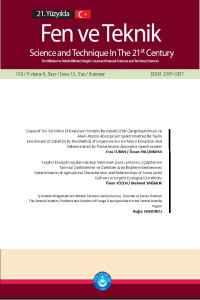Araştırma Makalesi
Amaç ve Kapsam
21. Yüzyılda Fen ve Teknik uluslararası ve disiplinler arası bilimsel bir dergidir. Araştırma makaleleri, kısa iletişimler ve inceleme makaleleri yayınlamaktadır. Makalelerin uzunluğu konusunda herhangi bir kısıtlama yoktur. Amacımız, bilim insanlarını deneysel ve teorik araştırmalarını mümkün olduğunca ayrıntılı olarak yayınlamaları noktasında teşvik etmektir. Yayın sürecine alınması uygun görülen makaleler kör hakemleme sistemi ile değerledirilecektir.
Biyoloji
Dünya ve Çevre
Ekoloji
Enerji
Fizik
İklim değişikliği
İstatistik
Kimya
Malzeme Bilimi
Mühendislik Çalışmaları
Ormancılık
Uzaktan Algılama
Yazım Kuralları
Etik İlkeler ve Yayın Politikası
The publication process of the Science and Technology in the 21st Century takes place within the framework of ethical principles. The procedures in the process support the quality of the studies. For this reason, it is of great importance that all stakeholders involved in the process comply with ethical standards.
Science and Technology in the 21st Century expects its readers, authors, reviewers, and editors to take ethical responsibility.
The ethical codes expected from the studies and publication processes of the Science and Technology in the 21st Century are stated below in the light of the guidelines and policies prepared by the Committee on Publication Ethics-COPE.(For detailed information COPE Code of Conduct and Best Practice Guidelines for Journal Editors).
Ethic principles for authors Ethic principles for referees Ethic principles for Editors
Originality
Conflicts of interest
Double-Blind Referee Review
Accuracy
Co-authoring
Copyright Reciprocity
Right to Refuse
Conflict of Interest
Double-Blind Referee Review
Punctuality
Unbiased
Privacy Independence
Unbiased
Conflict of Interest
Double-Blind Referee Review
Privacy
Review Quality
Punctuality
Decision Quality
Performance
Ethic principles for authors
The works must be original, not published elsewhere and in accordance with scientific research and publication ethics.
Authors should confirm that they have read and understood the author's instructions.
All authors are expected to contribute to the study.
All data in the article should be real and original.
Whether or not the article requires ethical committee approval is the responsibility of the authors. Ethics committee approval should be stated at the end of the article with the material and method.
Ethic principles for referees
Comments should be made objectively.
Personal criticism of the author is not appropriate.
Referees should express their views openly, with supportive discussions and references when necessary. However, it should not be defamatory or defamatory.
Referees must declare competing interests.
Referees should refuse to review articles with conflicts of interest resulting from:
competitive, collaborative, or other relationships or links or affiliated organizations with authors, companies.
Referees should respect the confidentiality of the materials provided to them and should not discuss unpublished articles with their colleagues or use the information in their own work.
If a referee wants to send a review request to a colleague, he / she must obtain the editor's permission in advance.
Referees must be impartial.
Ethic principles for Editors
Writing independence should be ensured. Editorial decisions should be based on the quality of the work and the appropriate referee evaluation rather than on political, financial or personal effects.
Editors are obliged to guide the referees for any information. This information sharing should be based on COPE principles.
Editors should adopt an appropriate review process for their journals, workspaces, and resources.
Editors should not be refused to publish in their own journals, but should not take advantage of their positions. Proceed according to the journal procedure.
The principle of editorial independence should always be adopted.
Unethical Behaviour
Should you encounter any unethical act or content in TİD apart from the ethical responsibilities listed above, please notify the journal by e-mail at merayembilder@gmail.com
Publication Policy
Turkish Journal of Range and Forage Science adopted the policy of providing open access with the publication.
Open access will lead to beneficial outcomes for humanity by increasing the global exchange of information.
There is no article processing and article submission charge from submitted articles for publication in Turkish Journal of Range and Forage Science.
Policy to Plagiarism
The authors have to check the articles against the plagiarism with the "iThenticate Plagiarism Detection" software before the manuscript submit. Except for the references section, the similarity index in the search will have to be below 20%. It is mandatory that the iThenticate software be provided in the report when the article is being recorded on the manuscript submit. The journal routinely screen article submissions for plagiarism.
Ücret Politikası
21. Yüzyılda Fen ve Teknik dergisinde yayımlanan makaleler için yazara herhangi bir ücret ödenmez ve de yazardan ücret talep edilmez.
21. Yüzyılda Fen ve Teknik dergisine makale gönderimi, makale-editörlük süreçleri veya yayın ücreti (sayfa veya renk ücretleri) için herhangi bir ücret talep edilmemektedir.

